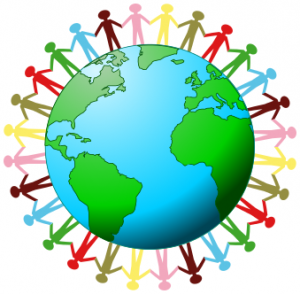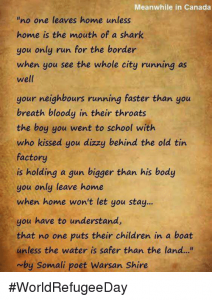
Trying to notice the obvious…in relation to the refugee crisis
Our speaker on Thursday was Father Cedric, an individual who clearly practices what he preaches about the need to share warmth and kindness with the world. He offered us some of his wisdom in relation to displacement and refugees. During one activity about words we associate with refugees, he reminded us that we were forgetting one of the most central words, because sometimes the obvious is easy to overlook. I began noticing a pattern, what sometimes seems like it should be crystal clear, has somehow become alarmingly distant from individual and societal practices. In relation to peacebuilding and the refugee crisis, it seems like there are numerous ways that we cannot see our noses in front of our faces (I might have picked up this idiom from my grandma, who was a dictionary of obscure phrases. Just in case, it references being oblivious to something in clear view).

Father Cedric discussed the importance of having friends of different races and religions. He reinforced that the increasingly common ‘fear of the other’ that we see in society can be remedied by friendships. Being friends allows us break down fears, or prevent them from ever arising. I questioned what this looked like for me growing up — I am from a suburban town in a state that is 94% white (Vermont). I was not very curious when I was younger about the different ways that people view and experience life, likely because my classmates and I all shared quite similar views, and the education system did not push us to critically consider these questions. I had one friend of a different race than myself, and she was the only individual of color in my elementary school classes. It made me think about how difficult that must have been, and I doubt that as we grew up anyone sought to listen to that story, which made me feel frustrated that I was so short sighted. It points to the need to pose real questions about people’s beliefs, experiences and values, and to actually listen to one another. It made me additionally grateful for the opportunities I have had to live in the homes of those with backgrounds completely different than my own, and to ask about their families, what they care about, their history, their hardships, and their successes. When I have the chance to do this, I realize it is easy to build caring relationships and connect. It seems like in today’s day and age, life is structured around separation rather than unity. Where we live, places of worship, what we do for fun, and where we spend our time, doesn’t invite a great deal of sharing across cultures, and other lines that have become deemed ‘boundaries.’ It makes me reconsider how something as seemingly straightforward and attainable as intercultural friendship, can holding immense potential in addressing issues related to refugees, migration, and social divisions.

Another essential point that our speaker highlighted that we need to recognize is where refugees come from and why they are displaced. It is somehow all too easy for us to overlook the reality that U.S. practices and vested interests create situations of violence and conflict, where refugees are then are forced flee their homes as a last resort. The irony and injustice of this is alarming. When I was in the Andes, I learned about the School of the Americas, located in Fort Benning, Georgia. Since 1946, SOA has trained a roster of graduates that returned to Latin America to become ruthless military dictators. Although friendly to U.S. interests, they perpetrated gross human rights violations as leaders. This is just one example of an inconvenient truth that is forgotten when we consider what types of policies, approaches and beliefs to enact in relation to refugees and asylum seekers. How have we overlooked that many of our vested political and economic interests result in the displacement of millions of people? We must see beyond the end of our own noses (…include a broader perspective that encompasses reality)! To address the root causes of refugee crises, as a nation we have a bit of uncomfortable searching to do about our own role, and how to ameliorate those root causes through transforming actions.

This past semester, my friend and SPP classmate Emily and I did a project in our Spanish class about climate refugees. The number of displaced people in the world will only be growing, largely due to climate change. Although it has been predominately created by the global North, the effects are disproportionately suffered in the global South. This fact is matched by increasingly nationalist policies in relation to refugees, migrants, and asylum seekers, a frightening pattern that shows how we have forgotten these individual’s humanity. This project and our session today cemented my conviction that the refugee crisis merits an incredible amount of attention and resources that it is not receiving. A return to the messages of glaring overtness that we learned through this session, could play a central role in building an international community that equally values everyone on our Earth.

